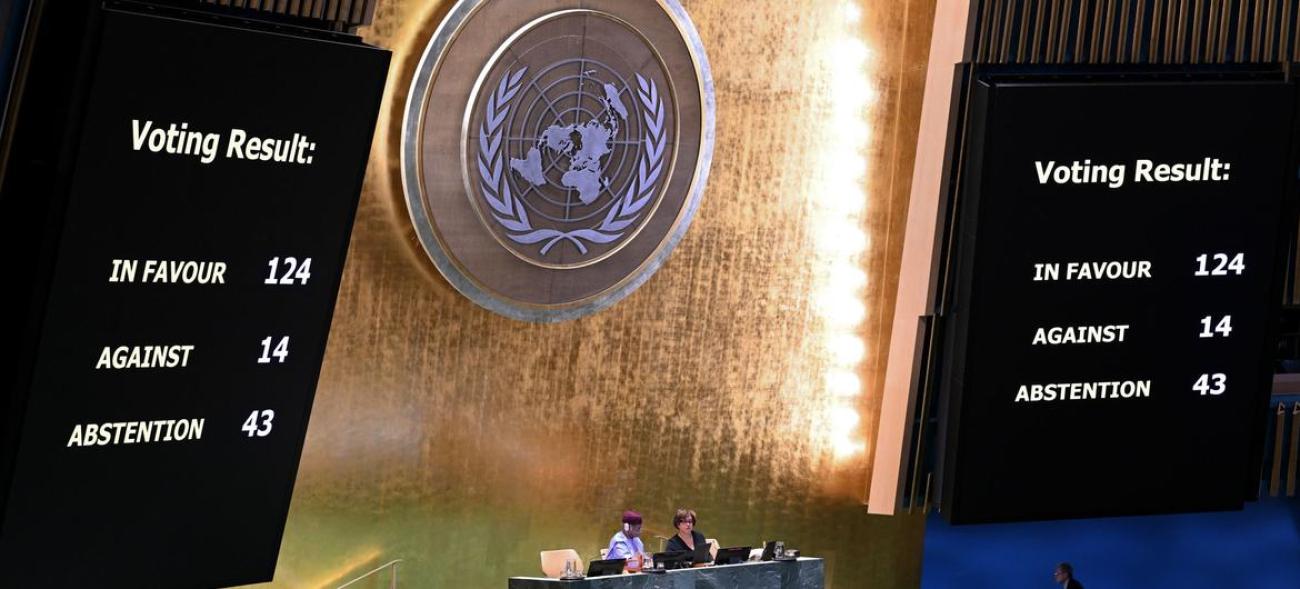UN General Assembly demands Israel end ‘unlawful presence’ in Occupied Palestinian Territory

The General Assembly voted to adopt a resolution demand that Israel “brings to an end without delay its unlawful presence” in the Occupied Palestinian Territory
With a recorded vote of 124 nations in favour, 14 against, and 43 abstentions, the resolution calls for Israel to comply with international law and withdraw its military forces, immediately cease all new settlement activity, evacuate all settlers from occupied land, and dismantle parts of the separation wall it constructed inside the occupied West Bank.
The General Assembly further demanded that Israel return land and other “immovable property”, as well as all assets seized since the occupation began in 1967, and all cultural property and assets taken from Palestinians and Palestinian institutions.
The resolution also demands Israel allow all Palestinians displaced during the occupation to return to their place of origin and make reparation for the damage caused by its occupation.
The resolution stems from the advisory opinion issued by the International Court of Justice (ICJ) in July, in which the Court declared that Israel’s continued presence in the Territory “is unlawful”, and that “all States are under an obligation not to recognize” the decades-long occupation.
Click here for the full text of the resolution and here for our live coverage of the meeting.
Threat to peace and security
The Assembly “strongly deplored the continued and total disregard and breaches” by the Government of Israel of its obligations under the UN Charter, international law and UN resolutions, stressing that such breaches “seriously threaten” regional and international peace and security.
It also recognized that Israel “must be held to account for any violations” of international law in the Occupied Palestinian Territory, including of international humanitarian and human rights laws.
The text says Israel “must bear the legal consequences of all its internationally wrongful acts, including by making reparation for the injury, including any damage, caused by such acts.”
The General Assembly highlighted the need for the establishment of an international mechanism for reparations to address damage, loss, or injury caused by Israel’s actions.
It also called for creating an international register of damage caused, to document evidence and related claims.
International conference
The resolution also includes a decision to convene an international conference during the Assembly’s current session to implement UN resolutions pertaining to the question of Palestine and the two-State solution for the achievement of a just, lasting and comprehensive peace in the Middle East.
Additionally, the Assembly requested the UN Secretary-General to present proposals for a mechanism to follow up on Israel’s violations of article 3 of the International Convention on the Elimination of All Forms of Racial Discrimination, as identified by the ICJ.
Article 3 refers to racial segregation and apartheid and the undertaking by International Convention’s States Parties to prevent, prohibit and eradicate all practices of this nature in territories under their jurisdiction.
Call on States
In its resolution, the General Assembly called upon all UN Member States to comply with their obligations under international law and take concrete steps to address Israel’s ongoing presence in the Occupied Palestinian Territory.
The Assembly urged States to refrain from recognizing Israel’s presence in the Territory as lawful and to ensure that they do not provide aid or assistance in maintaining the situation created by the occupation. This includes taking measures to prevent their nationals, companies, and entities under their jurisdiction from engaging in activities that support or sustain Israel’s occupation.
Additionally, the Assembly called on States to cease importing products originating from Israeli settlements and to halt the transfer of arms, munitions, and related equipment to Israel in cases where there are reasonable grounds to suspect they may be used in the Occupied Palestinian Territory.
Moreover, the resolution urged States to implement sanctions, such as travel bans and asset freezes, against individuals and entities involved in maintaining Israel’s unlawful presence in the Territory. This includes addressing issues related to settler violence and ensuring that those engaged in these activities face legal and financial consequences.
Adjournment
Finally, the Assembly temporarily adjourned its tenth emergency special session and authorized the President of the General Assembly to reconvene the session upon request from Member States.
The special session is a continuation of the tenth emergency special session of the General Assembly that last met in May amid the ongoing crisis in Gaza, during which it adopted a resolution, laying out additional rights for the State of Palestine’s participation in Assembly meetings.
That resolution did not grant Palestine the right to vote or put forward its candidature to UN Main Organs such as the Security Council or the Economic and Social Council (ECOSOC).
It also did not confer membership to the State of Palestine, which requires a specific recommendation from the Security Council.

